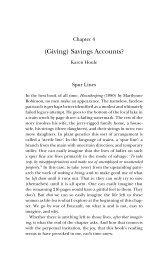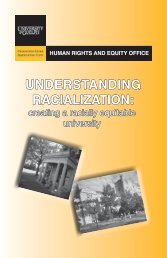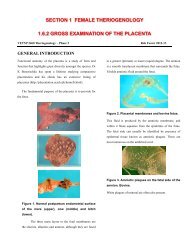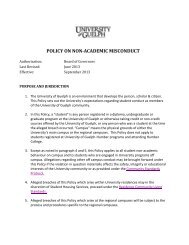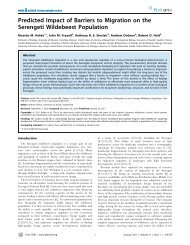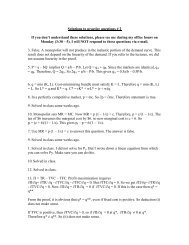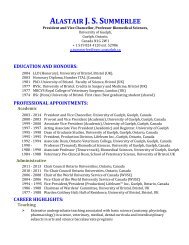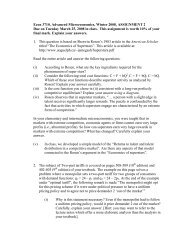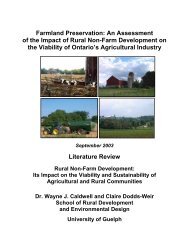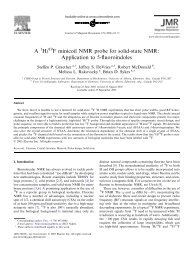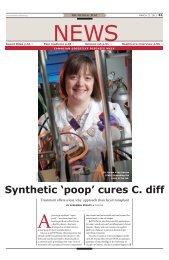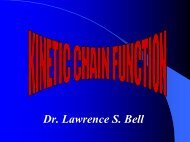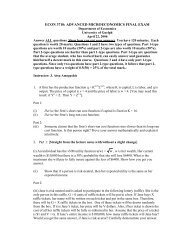Vol.4 Issue No.1 - University of Guelph
Vol.4 Issue No.1 - University of Guelph
Vol.4 Issue No.1 - University of Guelph
You also want an ePaper? Increase the reach of your titles
YUMPU automatically turns print PDFs into web optimized ePapers that Google loves.
Page 22012 CPADEALUMNIAs part <strong>of</strong> the self-study for applying for re-accreditation, 35 doctoral graduates <strong>of</strong> theprogramme received a survey from DCT Michael Grand, 18 <strong>of</strong> whom replied. Some excerpts areprovided below to give a sample <strong>of</strong> what alumni are doing and how they view the CP:ADEprogramme. Thank you to all <strong>of</strong> you who completed and returned the survey.Work setting:41% in a community mental health setting;29% in a hospital, 12% at a schoolboard, 35% in private practice and 6% asa research associate.Registration status:82% are currently registered registeredwith a College <strong>of</strong> Psychologists; 18% areIn the process <strong>of</strong> being registered .Percentage <strong>of</strong> alumni working with differentclient groups :Alcohol/drug use – 18%Child abuse/protection – 33%Poverty – 35%Minority cultural group - 47%Gay/Lesbian/Bisexual/Transgendered – 24%Developmental Delay – 65%Learning/cognitive disability – 94%Physical disability – 41%Chronic health problem – 29%Internalizing difficulties – 100%Externalizing difficulties – 100%Psychosis 17%Parental mental health - 53%First Nations communities – 29%Autism/developmental disabilities –71%Forensic – 6%pro bono work with clients 33% .Theoretical orientations identified with byalumni:Behavioral – 24%Cognitive Behavioral – 82%Developmental – 88%Family Systems – 53%Humanistic/Experiential – 6%Interpersonal – 29%Narrative – 24%Psychodynamic/Psychoanalytic - 12%Integrative – 18%Dialectic/ACT – 6%Research activities:Although 100% self- identified as primarilypractitioners, since graduating, severalhave published,, reviewed journal submissions,and/or received research grants.Knowledge translation:67% have given presentations to communitygroups and 39% have presented atconferences. Some (6% each) have appearedon TV or radio or a webinar, publishedarticles in magazines or newspapers;engaged in public health consultation,and/or lobbied or consulted withmembers <strong>of</strong> the Legislature. 11% testifiedin court as a psychologist. 33% donatedtime to pro bono work with non-pr<strong>of</strong>itgroups .Supervision <strong>of</strong> others:On average each alumni has supervisedone practicum students as well as interns,medical students, post docs, temporaryregistrants.Satisfaction with quality <strong>of</strong> CP:ADEtraining,54% replied very satisfied and 47% extremelysatisfied.Satisfaction with relevance <strong>of</strong> CP:ADEtraining:12% replied moderately satisfied, 53% verysatisfied, and 35% extremely satisfied.Assets <strong>of</strong> the programme identified by respondentsincluded:the Centre for Psychological Services toextend and enrich courseworkand practicum training underexcellent supervision and throughteam meetingsan integrative theoretical orientationthat highlighted the developmentalcontextualization <strong>of</strong> psychopathologyand focussed on typicaldevelopment firstdevelopment <strong>of</strong> a solid basis <strong>of</strong> programevaluation skillsthe small size <strong>of</strong> the programme makingit possible for the pr<strong>of</strong>essorsand associate clinicians to provideus with a great deal <strong>of</strong> attention,both in and out <strong>of</strong> classthe pr<strong>of</strong>essors and clinical supervisorsincluding their high level <strong>of</strong> expertise,variety <strong>of</strong> theoretical andpractical orientations and genuineinterest in the success <strong>of</strong> studentsto help students to thinkmore flexibly, rather than seeingthings consistently through thesame lensesthe supportive environment that discouragedcompetitiveness andcreated a wonderful place for developingand exploring my ownstrengths.Life in the Field: the realities <strong>of</strong> working in different sectorsOne <strong>of</strong> the questions on the Alumni survey asked what changes to the programme are recommended. One response was providing students with a greater understanding <strong>of</strong> the types<strong>of</strong> job opportunities available, some <strong>of</strong> the realities <strong>of</strong> working in different sectors (e.g., private,community, hospital, forensic); licensing/areas <strong>of</strong> competence; opportunities to becomeinvolved in local to global communities; how to maintain research involvement etc. Alumnican help with this through contributions to this newsletter. Everyone will appreciate your submissionon “Life in the Field” for future newsletters.



